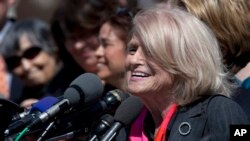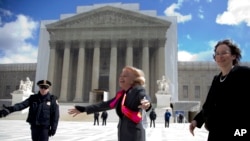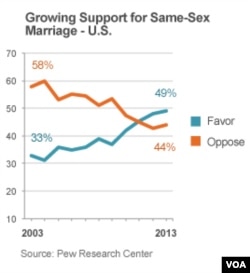WASHINGTON —
The issue of same-sex marriage has been front and center in Washington this week. The U.S. Supreme Court heard oral arguments in two cases that could have a profound impact on the legal and political acceptability of gay marriage around the country.
The two Supreme Court cases on gay marriage drew thousands of peaceful demonstrators, many of whom seemed to be aware that history could be in the making.
Dominic Parisi and his husband, Dan Zimmerman, stood on the court steps to show their support for gay marriage. Parisi says the show of support in front of the court sends a message to government leaders in Washington.
“I see the country going much faster than the court. But then you can see our sign. We have been together for 29 years," he said. "Actually, I’ve been going faster than the court for many years, so I think it’s time for the court to catch up.”
Zimmerman says the push for gay rights in the United States has been a grassroots effort.
“I think basically that the people are going to have to drag the politicians after them. I am surprised that the country has reached this point, but proud that we have,” he said.
Recent public opinion polls show a dramatic shift on gay marriage over the past several years. Some recent surveys show support for gay marriage at well beyond 50 percent.
Quinnipiac pollster Peter Brown sees parallels with the civil rights movement of the 1960s.
“We are in the midst of a change in attitudes towards gay rights in this country not dissimilar to the change that occurred in the 1960s toward African Americans,” he said.
But even with the shift in public opinion, significant numbers of Americans remain resistant to the idea of same-sex marriage.
That reluctance was on display during the recent Supreme Court arguments over California’s ban on gay marriage, known as Proposition 8.
Related video report by Michael Bowman:
Several conservative members of the high court approached the issue with caution, including Justice Samuel Alito.
“You want us to step in and render a decision based on an assessment of the effects of this institution, which is newer than cellphones or the Internet,” Alito said.
Even as the court heard arguments inside, hundreds of gay marriage opponents marched outside the court, determined to present their view that marriage should be between a man and a woman.
“We are trying to communicate the message that the issue here is not about the desires of adults but it should be about the needs of children," said Peter Sprigg, who is with the Family Research Council, a conservative activist group in Washington. "Marriage exists for the benefit of children, not to satisfy the desires of adults.”
But younger Americans in particular seem to be accepting gay marriage and that could have an impact on society far more sweeping than anything the Supreme Court might decide on the current cases.
Rachel, a college student in Washington, joined gay marriage supporters in front of the Supreme Court.
“Even conservative friends my age are still, for the most part, for gay marriage and it is just such a non-issue for people of my generation,” she said.
The nine-member high court is generally split between a conservative bloc and a more liberal bloc, with Justice Anthony Kennedy often the deciding vote in 5-4 rulings.
Legal experts say several of the justices seemed reluctant to issue a sweeping ruling in the case of California’s gay marriage ban, which has been struck down by a lower court.
The second case before the court involves a 1996 law known as the Defense of Marriage Act, which defines marriage as solely between a man and a woman. The law also prevents gay couples from receiving a range of federal benefits that go to married heterosexuals.
The plaintiff in that case is 83-year-old Edie Windsor. She was forced to pay federal taxes on the estate she inherited from her wife, Thea. But it is a tax that heterosexual spouses never have to pay.
Windsor spoke to reporters after the hearing about the changes she has seen as a gay American.
“And I think it just grew to where we were human beings like anybody else," she said. "I mean you guys, I’m talking to you freely. I’d have been hiding in a closet 10 years ago!”
Supreme Court rulings in both gay marriage cases are expected before the end of June. But no matter the outcome, same-sex marriage supporters who demonstrated at the court said this week will be remembered as a landmark moment in the struggle for equal rights for gay and lesbian Americans.
The two Supreme Court cases on gay marriage drew thousands of peaceful demonstrators, many of whom seemed to be aware that history could be in the making.
Dominic Parisi and his husband, Dan Zimmerman, stood on the court steps to show their support for gay marriage. Parisi says the show of support in front of the court sends a message to government leaders in Washington.
“I see the country going much faster than the court. But then you can see our sign. We have been together for 29 years," he said. "Actually, I’ve been going faster than the court for many years, so I think it’s time for the court to catch up.”
Zimmerman says the push for gay rights in the United States has been a grassroots effort.
“I think basically that the people are going to have to drag the politicians after them. I am surprised that the country has reached this point, but proud that we have,” he said.
Recent public opinion polls show a dramatic shift on gay marriage over the past several years. Some recent surveys show support for gay marriage at well beyond 50 percent.
Quinnipiac pollster Peter Brown sees parallels with the civil rights movement of the 1960s.
“We are in the midst of a change in attitudes towards gay rights in this country not dissimilar to the change that occurred in the 1960s toward African Americans,” he said.
But even with the shift in public opinion, significant numbers of Americans remain resistant to the idea of same-sex marriage.
That reluctance was on display during the recent Supreme Court arguments over California’s ban on gay marriage, known as Proposition 8.
Related video report by Michael Bowman:
Several conservative members of the high court approached the issue with caution, including Justice Samuel Alito.
“You want us to step in and render a decision based on an assessment of the effects of this institution, which is newer than cellphones or the Internet,” Alito said.
Even as the court heard arguments inside, hundreds of gay marriage opponents marched outside the court, determined to present their view that marriage should be between a man and a woman.
“We are trying to communicate the message that the issue here is not about the desires of adults but it should be about the needs of children," said Peter Sprigg, who is with the Family Research Council, a conservative activist group in Washington. "Marriage exists for the benefit of children, not to satisfy the desires of adults.”
But younger Americans in particular seem to be accepting gay marriage and that could have an impact on society far more sweeping than anything the Supreme Court might decide on the current cases.
Rachel, a college student in Washington, joined gay marriage supporters in front of the Supreme Court.
“Even conservative friends my age are still, for the most part, for gay marriage and it is just such a non-issue for people of my generation,” she said.
The nine-member high court is generally split between a conservative bloc and a more liberal bloc, with Justice Anthony Kennedy often the deciding vote in 5-4 rulings.
Legal experts say several of the justices seemed reluctant to issue a sweeping ruling in the case of California’s gay marriage ban, which has been struck down by a lower court.
The second case before the court involves a 1996 law known as the Defense of Marriage Act, which defines marriage as solely between a man and a woman. The law also prevents gay couples from receiving a range of federal benefits that go to married heterosexuals.
The plaintiff in that case is 83-year-old Edie Windsor. She was forced to pay federal taxes on the estate she inherited from her wife, Thea. But it is a tax that heterosexual spouses never have to pay.
Windsor spoke to reporters after the hearing about the changes she has seen as a gay American.
“And I think it just grew to where we were human beings like anybody else," she said. "I mean you guys, I’m talking to you freely. I’d have been hiding in a closet 10 years ago!”
Supreme Court rulings in both gay marriage cases are expected before the end of June. But no matter the outcome, same-sex marriage supporters who demonstrated at the court said this week will be remembered as a landmark moment in the struggle for equal rights for gay and lesbian Americans.









